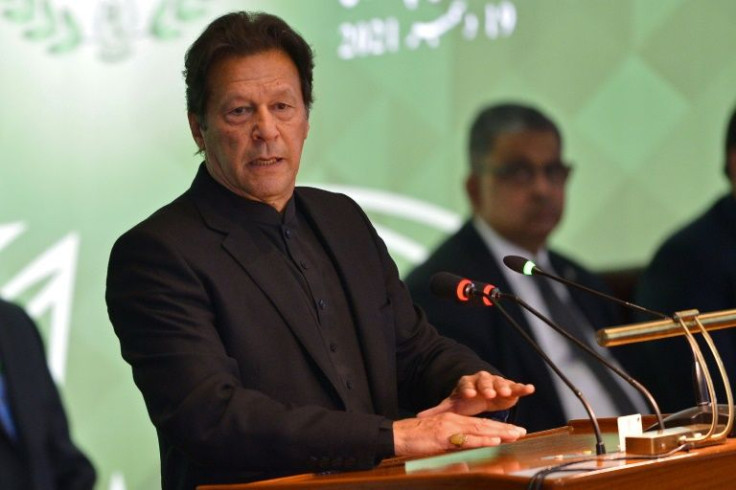Imran Khan Bowls A Googly To Tame Inflation And Army Generals

Pakistan's inconsistent growth rate, rising debt payments, increasing current account and fiscal deficits, and poor security scenario are giving sleepless nights to its premier literally.
Pakistan Rupee is among the world's worst-performing currencies and has depreciated with respect to all major currencies in recent times.
What is causing sleeping disorder to former cricketer-turned-prime minister is the rising inflation which astronomically increased from 5.65 percent in January-2021 to 12.3 percent in December 2021.
Despite a $5 billion trade deficit and a vast diaspora's remittances growing nearly 10 percent to $12.9 billion, the rupee has taken a pounding, losing 12 percent to the dollar since July. The biggest problem at hand is servicing nearly $127 billion in debt.
On Jan. 23, answering a woman caller at the fifth session of Aap Ka Wazir Azam Aap Key Sath (your prime minister with you) program where 69-year-old Khan receives direct calls from the public, he revealed that inflation is the biggest challenge and that he was unable to sleep at night while thinking out it.
He, however, hastily disowned the rising inflation as his own government's making which he is heading since 2018. Khan blamed it on global inflation, the global supply chain crisis, and the global outbreak of Covid-19.
According to him, it has affected all nations and it is being felt in Pakistan in part.
Khan has taken steps to prevent Pakistan from defaulting on its loan commitments as the government has secured $3 billion each from all-weather friend China and closest ally Saudi Arabia, and $2 billion from the United Arab Emirates.
But the Chinese help has been dwarfing of late. FDI inflow from China declined to $650.8 million during July-March (FY2020-21) compared with $859.3 million during the same period in the previous year.
To add salt to the wound, the current government, led by Khan's Pakistan Tehreek-e-Insaaf (PTI) party, nearly doubled the foreign debt in three years, adding $ 35.1 billion to make it $85.6 billion as of June 30, 2021.
Though Khan successfully negotiated a $6 billion International Monetary Fund (IMF) loan package in 2019, the disbursal is struck in the delay in implementing the promised austerity measures, including slashing sops on essentials.
Khan, however, accepted the painful IMF conditions that included hiking fuel and power prices and through supplementary bills or mini-budget on Jan. 13 the government increased taxes on a range of imports, exports, and services. It drew flak from the public as the cost of living increased and calls for his ouster found many takers.
The opposition Pakistan Peoples Party (PPP) has already announced a march from the largest city Karachi to the capital Islamabad over inflation and unemployment and to get rid of the "incompetent government."
In fact, it is not the rising inflation that is giving sleepless nights to Khan. What is causing trouble to his sleep is who will take him over?
The Pakistan army has a long history of toppling civilian governments under some pretext. Khan feared generals in Islamabad finding inflation an ideal candidate to stage a coup with the tacit support from the opposition.
The premier warned that he will be more ferocious if ousted from the power which they will find hard to resist.
"You will not find a place to hide if I take to the streets...I will just need to motivate people and others will be fleeing London to join the ones who already are there," the premier said while hinting toward former prime minister and Pakistan Muslim League leader Nawaz Sharif.
Former captain of the cricket-crazy country regularly speaks at public gatherings and addresses the nation through television channels.
However, a tete-a-tete with citizens is occasional.
























